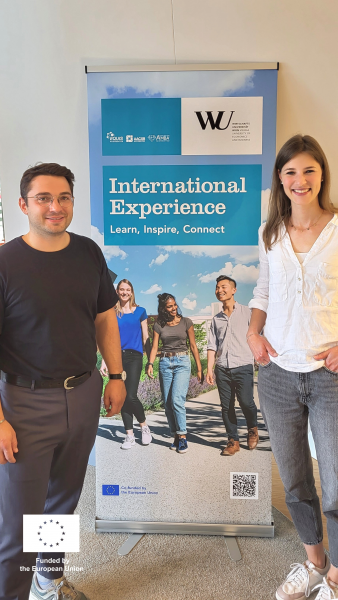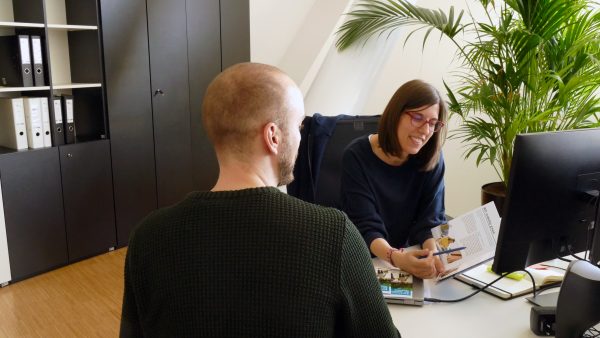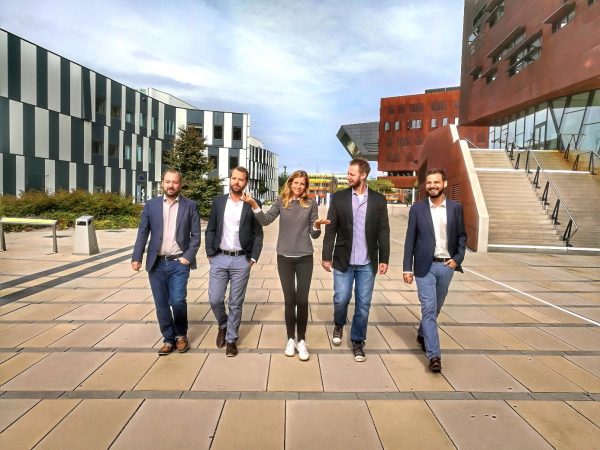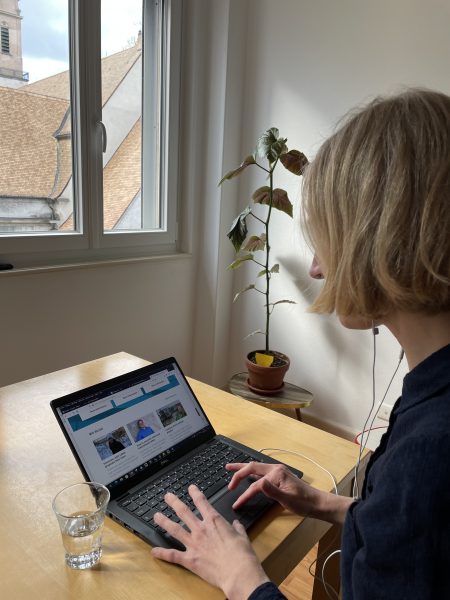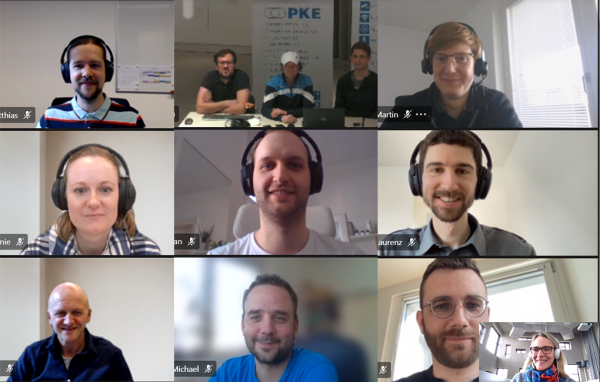Working in Academia… the job hunting guide for a PhD student in Finance
What is life like after pursuing a PhD? Where are the jobs advertised? What does it mean to “work in academia”? Every year PhD students from the Vienna Graduate School of Finance (VGSF) take the intimidating path towards finding a job in academia. They join the yearly “job market” where students from schools all across the world compete to find their best match. The market is competitive and students must be prepared to deal with stress and a tight schedule, and never be caught off-guard. Here, VGSF students Roberto Pinto and Akos Horvath share their experiences on this year job market and the upcoming challenges for them.

Roberto Pinto will join the Lancaster Management Business School (UK) in August as an Assistant Professor.
WU Blog: How did you find the advertisements for the jobs?
Roberto Pinto: I checked job openings on several online platforms. The main ones in finance are SSRN and EconJobMarket. To keep track of the universities and the offers, I created an excel file with all relevant information (e.g. the name of the university, type of position, deadline, and its useful to save the link of the opening itself). Although the number of openings changes from year to year, I applied for about 70 academic positions in finance.
WU Blog: What are the steps that take you to an offer?
Roberto Pinto: After sending applications, my next step was to schedule interviews and collect more information of the universities. In the finance market, the interview system is very convenient. Universities which want to hire on the international job market, they conduct interviews during specific annual meetings. At the ASSA meeting in Philadelphia, I sat for interviews with European and American schools, and all took place in the same city in hotel rooms, which were at a walkable distance from each other.
Assuming your interviews go well, universities invite you for a fly-out, which consists of a campus visit where you present your work in a research seminar, meet with local faculty during the day, and typically go for lunch and dinner with them. This part can be very tiresome. Besides the stress of holding a seventy- to ninety-minute seminar, I had to coordinate my fly-outs to avoid any overlaps in the dates and to not keep travelling across continents.
In the last step, you receive an offer. I received an exploding offer from Lancaster University Management School, my future employer, the day after my visit there. I call it exploding because I had one week to bargain the contents of my contract and make a final acceptance/rejection decision.
WU Blog: How did you deal with the stress?
Roberto Pinto: Job-hunting is very stressful! The closer I was getting to the job market, the higher went my stress levels. I found sport and social activities very helpful. In particular, I looked for group sport activities. In the beginning, I was jogging, but it was not helping much because I kept thinking about my research project. As a result, I combined jogging and boxing training. Boxing required me to fully concentrate on the training, or my research would have costed me a punch!
Alongside with sports, I talked to my colleagues and with my advisor. Talking about a problem aloud helped me to realize where the issue lied.
WU Blog: How did VGSF prepare you for your career and the challenges of the job market?
Roberto Pinto: To quote a VGSF professor: “The job market starts in the first year of your PhD”. He was totally right! A key aspect the VGSF program is the balance between coursework and research. From the first year, I was asked to develop original research ideas. Despite the initial frustration of coming up with new ideas, it later turned out to be an advantage compared to other PhD programs where students start working on research projects in their second or even third year of the PhD.
WU Blog: What kind of challenges do you think you will have to face in your new job?
Roberto Pinto: Publications and teaching. To advance my academic career, in the next three years, I am required to meet certain standards in terms of publishing articles in peer-reviewed journals. My second challenge is teaching, because being able to convey the knowledge to students is a challenging and stimulating task. Moreover, business schools demand for high teaching standards and expect positive student evaluations. Therefore, I have many standards to meet!
WU Blog: Lastly, what is your research about?
Roberto Pinto: I am an applied financial economist focusing on corporate finance. To date, I have been concentrating on a long-standing question in corporate literature: “How do firms choose their optimal capital structure?” I am particularly interested in the economic mechanisms through which non-financial stakeholders of the firm, such as employees, affect the firm’s financing decisions. In my latest work, I show that the employees’ risk and cost of personal bankruptcy is an important channel that influences the amount of risk shared between the employer and employees. I combined empirical research and a labor market model to show that firms may be able to use financial leverage to extract the benefits from policies which aim at helping employees.

Akos Horvath will join the Federal Reserve Board of Governors as an Economist in the Supervision and Regulation Department.
WU Blog: How did you prepare yourself for a career in academia?
Akos Horvath: By enrolling in a good PhD program! For a successful academic career, you have to meet the challenge of “juggling many balls in the air”. On the one hand, you need to keep up with the latest techniques and results in your scientific field (by reading books, research articles, and attending conferences), and on the other hand, you need to leave your trace, make your own contribution therein (by writing books, articles, and presenting at conferences). On top of this, you need to find time for teaching and supervision of the next generation. VGSF was an excellent choice; it helped me to acquire all these skills, and initiated me gradually into the world of academia.
WU Blog: How did you find the advertisements for the jobs?
Akos Horvath: I used the standard academic finance job platforms (e.g. JOE and EconJobMarket) to look for job postings.
WU Blog: What are the steps that take you to an offer?
Akos Horvath: The common answer is “it depends”. It depends on the country, the institution, even the field. However, most of all, it depends on the hiring procedure of the organizational unit that you are applying to. In my case, I received a fly-out within a week after my interview, and received an offer within two weeks after my fly-out, which I gladly accepted without further negotiation.
WU Blog: How did you deal with the stress?
Akos Horvath: What stress…? Just kidding! I tried to prepare as much for each interview as possible to reassure myself that I was doing everything required for the particular job. In addition, I increased the frequency of my regular running sessions. Sports helped me to relax.
WU Blog: How did VGSF prepare you for your career and the challenges of the job market?
Akos Horvath: I received a great amount of support from VGSF faculty. In addition to attending a series of PhD-level courses in the field of finance and econometrics, I received regular feedback on my scientific work from many faculty members. Throughout the years, I also had the opportunity to attend and present my work at excellent conferences. There, I could experience firsthand how the world of academia worked. Finally, VGSF organizes various activities that prepared me well for the job market. I received professional counseling and gave mock interviews conducted by the faculty, which helped me perform well in the real ones.
WU Blog: What kind of challenges do you think you will have to face in your new job?
Akos Horvath: Besides the short-term challenges posed by physically relocating to another country, I will need to adopt the culture of my new workplace, get to know my colleagues, and catch up with their work and ideas.
WU Blog: Lastly, what are your research interests?
Akos Horvath: I am interested in financial econometrics, empirical corporate finance, and market microstructure. I carried out an empirical analysis on the impact of three recent regulatory changes. These measures aimed to alleviate the liquidity shortage in capital and credit markets after the financial crisis. In my working papers, I performed rigorous econometric analysis, and investigated the efficacy of the newly implemented programs.
About the School
The Vienna Graduate School of Finance (VGSF) was founded in 2005 as a joint initiative of the Institute for Advanced Studies, the University of Vienna, and the Vienna University of Economics and Business, with financial support from the Austrian Science Fund (FWF). The three institutions joined forces to create a hub in Vienna that is large enough to produce internationally recognized research and provide a competitive PhD education. These efforts have resulted in the creation of the well-structured, five-year PhD program in Finance, which trains students to become ambitious researchers in the field of finance. The research expertise of the VGSF faculty spans the broad areas of corporate finance, financial intermediations, and market microstructure. The VGSF has a well-established network in the international finance community. The faculty members collaborate with renowned experts and academics, who are often invited to the VGSF to serve as guest lecturers or to hold seminars.














